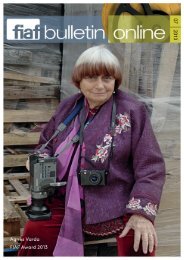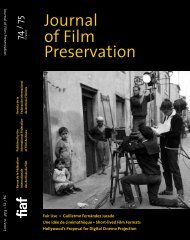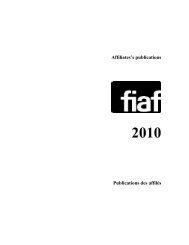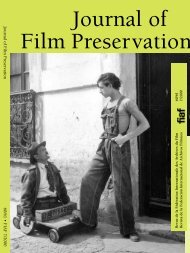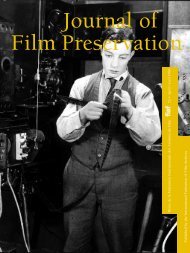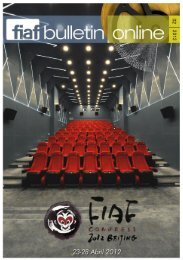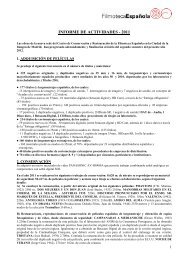Journal of Film Preservation - FIAF
Journal of Film Preservation - FIAF
Journal of Film Preservation - FIAF
Create successful ePaper yourself
Turn your PDF publications into a flip-book with our unique Google optimized e-Paper software.
Muchachas de Bagdad, Los Amantes del desierto...), Florián Rey’s film is<br />
the only one set in a Protectorate <strong>of</strong> Morocco that, in spite <strong>of</strong><br />
everything, appears to be more or less real. And thus, although<br />
initially the film looks to be simply a troubled love story, La Canción<br />
de Aixa also serves as an idyllic showcase for the tutelary gaze by<br />
Spain over its possessions and consistently satisfies the basic demand<br />
<strong>of</strong> the colonial cinema, that is, to familiarise the metropolis with an<br />
idealised image <strong>of</strong> the Empire.<br />
Nevertheless, the end <strong>of</strong> the Civil War closed this extremely<br />
interesting parenthesis in Spain’s colonial cinema, unaccountably<br />
overlooked and even forgotten by historians (probably due to the fact<br />
that these two films were actually not circulated until very recently).<br />
Naturally, this is not the result <strong>of</strong> a waning interest on a part <strong>of</strong> the<br />
Franco regime in its Africa-oriented vocation during the immediate<br />
post-war period – as is evident from the occupation <strong>of</strong> Tangiers in<br />
June 1940 – but rather simply stems from the fact that the exaltation<br />
<strong>of</strong> the centuries-long Hispano-Moroccan spiritual brotherhood gave<br />
way to a much more direct and limited militaristic discourse. Rosa de<br />
Africa (1941), a medium-length film by José López Rubio left no<br />
room for doubt and prefigured the tone <strong>of</strong> the better-known ¡Harka!<br />
(Carlos Arévalo, 1941). Little by little Africa became the privileged<br />
scenario <strong>of</strong> military glory, <strong>of</strong>fering a less problematic setting than the<br />
Civil War and extending, de facto, the civilising effort <strong>of</strong> Spain on a<br />
purely military keynote. The rhetoric <strong>of</strong> the Hispano-Moroccan<br />
brotherhood subsisted, <strong>of</strong> course, but in a more artificial and barely<br />
convincing manner: in practice, the Moors became obscure extras<br />
who relinquished their leading roles to the legionnaires who barely<br />
even deigned to address them to give them orders. For the most part,<br />
the Spanish films set in Africa in the forties were thus characterised<br />
by portraying an unreal image <strong>of</strong> the Protectorate in which no natives<br />
appeared to even exist.<br />
¡Harka! is an extremely interesting film from<br />
this perspective. Although its plot is<br />
basically circumscribed to the portrayal <strong>of</strong> a<br />
number <strong>of</strong> war exploits, somewhat out-<strong>of</strong>context,<br />
in a number <strong>of</strong> scenes Arévalo’s<br />
film explores the theme <strong>of</strong> the Llamada de<br />
Africa (call <strong>of</strong> Africa) so characteristic in<br />
Spanish colonial cinema. Although Captain<br />
Valcázar (role played by Alfredo Mayo) is<br />
the character who was seen to embody the<br />
prototype <strong>of</strong> the military hero in North<br />
Africa in virtue <strong>of</strong> the perfect adaptation <strong>of</strong><br />
the role to the medium, even a very<br />
superficial analysis <strong>of</strong> ¡Harka! reveals how much <strong>of</strong> a sentiment<br />
<strong>of</strong> self-defence (and self-punishment) lies in that attitude. On<br />
the contrary, Lieutenant Herrera (role played by Luis Peña) is<br />
the character who truly appears to feel in some way united in spirit<br />
33 <strong>Journal</strong> <strong>of</strong> <strong>Film</strong> <strong>Preservation</strong> / 63 / 2001<br />
Shooting <strong>of</strong> Romancero Marroquí, Carlos Velo, Enrique<br />
Dominguez Rodiño (1939). Operator: Cecilio Paniagua.<br />
Courtesy <strong>of</strong> the <strong>Film</strong>oteca Española, Madrid



